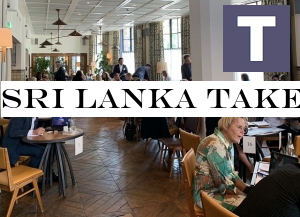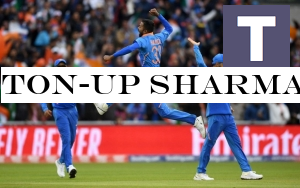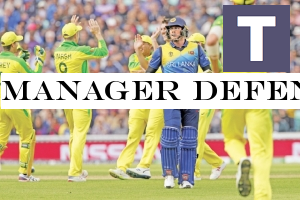Music
Trailers
DailyVideos
India
Pakistan
Afghanistan
Bangladesh
Srilanka
Nepal
Thailand
Iraq
Iran
Russia
Brazil
StockMarket
Business
CryptoCurrency
Technology
Startup
Trending Videos
Coupons
Football
Search
Download App in Playstore
Download App
Best Collections
Srilanka

The much-needed two Samsung HS40 Ultrasound Scanner Units, purchased from the daypay of Army personnel were formally handed over to Maharagama ‘Apeksha& Cancer Hospital this morning (17) by the think-tank of the meritorious project, Lieutenant General Mahesh Senanayake, Commander of the Army. On arrival, the dayChief Guest Lieutenant General Mahesh Senanayake, Commander of the Army was warmly welcomed by Dr Wasantha Dissanayake, Director, Maharagama ‘Apeksha& Hospital and members of the Association to Fight Against Cancer.
- Details
- Category: Srilanka
Read more: Day’s Pay of Army Personnel Goes to ‘Apeksha’ Hospital
Write comment (93 Comments)
Sri Lanka was prominently featured at a luxury Travel Show, held in the Dutch capital Amsterdam recently. Following the Easter Sunday terror attacks on 21 April this year and the issuance of negative travel advisories by several countries, including The Netherlands, tourist arrivals in Sri Lanka plummeted. Many Dutch people who had intended to visit Sri Lanka cancelled their travel plans in light of the travel advisory issued by the Dutch Government, with only those having urgent business visiting Sri Lanka.
- Details
- Category: Srilanka
Read more: SRI LANKA TAKES CENTRE STAGE AT THE AMSTELUXE TRAVEL SHOW IN AMSTERDAM
Write comment (98 Comments)
The national program of establishing 5000 "Export Program Villages" will be launched today from Dehiattakandiya, Chandanagama village in Ampara district under the patronage of Minister of Primary Industries and Social Empowering Daya Gamage. The objective of the Agriculture Sector Modernization Project - Value Added Development Program is to promote the primary products of the farmers through an integrated process of value addition to suit the export market. Under the program 5000 export villages will be constructed in two phases.
- Details
- Category: Srilanka
Read more: 5000 Export Zone Villages to begin today
Write comment (98 Comments)
IndiaRohit Sharma (L) celebrates with Indiacaptain Virat Kohli after scoring a century (100 runs) during the 2019 Cricket World Cup group stage match between India and Pakistan at Old Trafford in Manchester, northwest England, on June 16. AFPIndiaRohit Sharma (L) celebrates with Indiacaptain Virat Kohli after scoring a century (100 runs) during the 2019 Cricket World Cup group stage match between India and Pakistan at Old Trafford in Manchester, northwest England, on June 16. AFPManchester, Sunday: Rohit Sharma scored his second hundred in three innings as India maintained their unbeaten record against Pakistan at the World Cup with an 89-run win under the Duckworth-Lewis-Stern method on Sunday.
Sharma140 was the centrepiece of a total of 336-5 that also featured captain Virat Kohli77.
Victory in this rain-curtailed clash saw India, who have now won all seven of their World Cup matches against Pakistan, remain unbeaten after four pool games at this yearedition.
Pakistan, whose only 2019 pool win so far was a shock defeat of hosts England, were never truly up with the rate in the showpiece match of the 10-team round-robin stage.
They still had hope at 117 for one even though the most made by any side batting second to win a World Cup match is Ireland329 for seven against England at Bangalore in 2011.
But Kuldeep Yadav then struck twice to spark a collapse that saw Pakistan lose four wickets for 12 runs in 18 balls as they slumped to 129 for five in 27 overs -- long past the 20-over cut-off point needed for a result under D/L.
A third rain stoppage came with Pakistan 166-6 off 35 overs. The match then descended into something of a farce when play resumed under leaden skies, with Pakistan requiring an outlandish 136 more runs in five overs to reach a revised victory total of 302 in 40 overs.
That target which, eventually became 94 off the last six balls, unsurprisingly proved beyond them as Pakistan finished on 212-6, dealing a major blow to their semi-final hopes as India took the bragging rights yet again.
Worryingly for India, paceman Bhuvneshwar Kumar limped off in the fifth over of Pakistanchase with a hamstring injury that sidelined him from the rest of the match.
But Vijay Shankar, completing the over, struck first ball when he had opener Imam-ul-Haq lbw for seven.
Fakhar Zaman (62) and Babar Azam (48) repaired the damage with a century stand, before they both fell to left-arm wrist-spinner Yadav as they tried to up the tempo.
Babar was bowled between bat by a superb delivery before Zaman miscued a sweep to short fine leg.
All-rounder Hardik Pandya then took two wickets in two balls.
Mohammad Hafeez was caught at deep square leg before Shoaib Malik played on for his second successive duck -- a wicket greeted with huge roars by the massed ranks of India fans in a capacity crowd, with an estimated one billion watching on television.
Earlier, Kohli became the quickest player to 11,000 one-day international runs, getting there in 222nd innings compared to compatriot Sachin Tendulkarprevious record of 276 innings.
Meanwhile, Pakistan left-arm quick Mohammad Amir continued his fine form with 3-47 despite two early warnings for running on the pitch. But not even Amir could stop Sharma and KL Rahul (57) marking their first ODI match as a opening duo with a stand of 136 after Pakistan captain Sarfaraz Ahmed won the toss.
Sharma, who made 122 in Indiaopening win over South Africa and 57 against Australia, went to fifty with a six over long-on and a cut four off successive deliveries from recalled leg-spinner Shadab Khan.
He then entered the 90s with an extraordinary square-cut six off paceman Hasan Ali.
His single off Shadab saw Sharma to an 85-ball hundred including three sixes and nine fours. It was Sharma24th ODI century. But a quickfire stand of 98 with Kohli ended when Sharma, trying a needlessly extravagant scoop, flicked Hasan to short fine leg. AFP
- Details
- Category: Srilanka
Read more: Ton-up Sharma stars as India beat rivals Pakistan
Write comment (90 Comments)
LONDON, Sunday: Sri Lanka manager Ashantha de Mel has defended his players for not turning up for the official post-match press conference after their World Cup defeat against Australia at the Oval here on Saturday. It is the norm at all ICC conducted tournaments for a player to be present for the pre and post-match media conferences, but after Sri Lanka had thrown away a golden chance of beating world champs Australia no member of the team presented himself at the conference which reflected badly on the losing side. &What can you do when no one wanted to go to the press conference The players were so deflated after letting go off such a golden opportunity to post a win they were not prepared to go and face further questions and be humiliated,& said De Mel.&We had some issues at Cardiff where the players were unhappy with certain questions thrown at them by the media writing the team off. They were not prepared to go and face them especially after todaygame,& he said. Asked whether the ICC had written or spoken to him about the no-show, De Mel said they had not. &I am prepared to go and answer the questions myself but the request is for players whom we don&t want to further undermine their confidence when it is already low.&Australia was represented by their captain Aaron Finch at the media conference.Although Sri Lanka lost the contest by 87 runs, De Mel said that there were a lot of positives they got out of the match. &We know we have a solid opening combination in Dimuth Karunaratne and Kusal Perera and our bowling at the death was also very good, but we have to improve our fielding and create chances because we are not a great bowling side,& said de Mel who is also the chairman of selectors. &Our middle order batting is a big concern with Kusal Mendis and Angelo Mathews not firing. Our late order batsmen must also learn that they cannot hit a six off every ball against a good bowling attack. I have been telling them that they should learn how to defend as well but in the nets all they do is try to hit the leather off the ball from ball one which is not helping our cause,& he said.CHANGE OF COLOUR IN CLOTHINGSri Lanka has six days off before their next game which is against England at Headingley, Leeds on June 21 and, for which they will have to change their top coloured clothing. &We have been asked to have less blue and more yellow in our shirts for the matches against India and England because these two countries also have a lot of blue in their playing kits,& said De Mel. Thus, for the matches against England and against India which is on July 6 at Leeds, the Sri Lankan players will wear a different coloured top with more yellow than blue than they have at present. The Lankan team left for Leeds yesterday where they will spend the next five days trying to rectify their mistakes learnt from the defeat against the Aussies.Despite their loss Sri Lanka still retain fifth spot with four more games to play against England, South Africa, West Indies and India. They need to win at least two of those matches to be realistically in with a chance of qualifying for a place in the semi-finals by finishing in the top four.
- Details
- Category: Srilanka
Read more: Manager defends players’ no-show at media conference
Write comment (94 Comments)
Trumphostile behaviour is reinvigorating efforts to turn the euro into an alternative to the worlddominant currency. If only the Europeans could find some way to do it. Europequest to find an alternative to U.S. financial dominance and the global rule of the dollar has only intensified since French and German leaders first howled about the need to recover their economic sovereignty last summer. But European governments are finding that coming up with a workable plan is a lot easier said than done—leaving them fuming but still vulnerable to Washingtonstrong-arm tactics.That doesn&t mean, however, the Europeans are going to give up trying—and that poses a long-term danger to U.S. power. Countries such as France and Germany first bristled at the Trump administrationdecision to unilaterally pull out of the 2015 Iran nuclear deal and reimpose crippling sanctions on Iran, putting European firms squarely in the crosshairs of U.S. sanctions. AmericaIran policy still rankles, and Europeefforts to create a so-called special purpose vehicle to enable some trade with Iran continue, with meetings taking place this week even with oil tankers ablaze just outside the Persian Gulf.But since the return of the Iran sanctions last year, the Trump administration has dramatically stepped up its use of sanctions and other economic weapons to force friends and foes alike to cow to its foreign-policy wishes. In addition to a tougher line on Iran, there have been increasing, crippling sanctions on Venezuela, including a blanket prohibition on any countries providing help for Venezuelaoil industry; further sanctions on Russian banks and individuals and repeated threats of U.S. sanctions on European firms working on a Russian gas pipeline in Germany; threats of sanctions against Turkey, a NATO ally, for its defense procurement decisions; and even an unprecedented application of 1990s-era Cuba legislation that is a direct threat to companies in Europe and elsewhere.Trump administrationThose sanctions come on top of a slew of heavy-handed trade actions, from huge tariffs on China meant to force Beijing to change its entire economic system to a tariff threat on Mexico designed to strong-arm the country into changing its migration policies—not to mention the Trump administrationcampaign to get countries around the world to blacklist ChinaHuawei, the worldbiggest telecoms equipment-maker.All this bullying from Washington is made possible because the U.S. dollar remains the worldreserve currency and the most used in cross-border transactions. Even so, the Trump administration is taking a risk in resorting to this financial weapon with an abandon seldom seen before, said John E. Smith, who stepped down last year as head of the U.S. Treasury Departmentsanctions arm. &Itof deep concern that the more the U.S. pushes Europe away from a common policy, the more they push Europe into finalizing true alternatives to the U.S. financial system,& which will ultimately weaken the United States& economic power and its ability to effectively wield sanctions, said Smith, now the co-head of the national security group at Morrison - Foerster.So far, adverse reaction to U.S. financial actions is boosting the europrospects—a bit. &[G]rowing concerns about the impact of international trade tensions and challenges to multilateralism, including the imposition of unilateral sanctions, seem to have lent support to the euroglobal standing& over the past year, the European Central Bank (ECB) concluded Thursday in its annual report on the use of the euro. While the euroshare of cross-border transactions stayed about the same—just under one-third of all transactions—the euroshare in global foreign exchange reserves grew over the last year, while the dollar dropped to its lowest level in almost 20 years. The ECB said some central banks are reducing dollar exposure due to the risk of unilateral actions.This week, French Finance Minister Bruno Le Maire rebuffed U.S. pressure to ban Huawei, citing the need to protect French sovereignty. This month, the governor of the Banque de France and a contender to become the next head of the ECB, called for a greater role for the euro to restore Europefinancial sovereignty. Leading French lawmakers, meanwhile, rail against U.S. extraterritorial sanctions and fret for the future of the trans-Atlantic alliance. Even Spain has fought back furiously against the U.S. revival of Cuba sanctions that threaten its leading businesses.While the United States has aggressively used its central position in the global financial system to impose sanctions on rogue actors since the 1990s, what President Donald Trump is doing is a whole new order of magnitude, Smith said. &The Trump administration is far more willing to confront even allies and seek to force changes to their foreign-policy position using threats of sanctions, as well as trade threats,& he said. &We&re hearing now from France and Germany what we used to hear from China and Russia.&The problem for U.S. allies in Europe, Asia, and elsewhere that are seeking a way around U.S. financial muscle is that it is proving extremely tough to unwind more than seven decades of dollar dominance. The U.S. financial system remains the central nervous system for the bulk of financial transactions. That gives U.S. policymakers the ability to squeeze other countries that is simply unmatched anywhere else, despite decades of sporadic efforts by countries like Japan, China, and others to make their currencies and banking systems an alternative.U.S. sanctionsThat is especially evident with Europeeffort to sustain trade with Iran through &INSTEX,& a special financial vehicle designed to allow limited trade in humanitarian goods and medicine despite U.S. sanctions. After a year of trying, Europe and Iran still don&t have the system up and running. More to the point, however much European governments (and Brussels) would like to honour their commitments to Iran under the auspices of the 2015 accord, European businesses have a calculus of their own—and that doesn&t include taking on the U.S. Treasury.Companies, even Russian and Chinese companies, do what is in their best interest. And even in Russia and China, they don&t automatically subordinate that self-interest to the wishes of the government,& said Barry Eichengreen, a professor of economics and political science at the University of California, Berkeley. &For the moment, using dollars remains convenient and economical from the company point of view.& - Foreign Policy
- Details
- Category: Srilanka
Read more: Europe’s Dream: Escaping the dictatorship of the Dollar
Write comment (92 Comments)Page 331 of 392

 9
9





